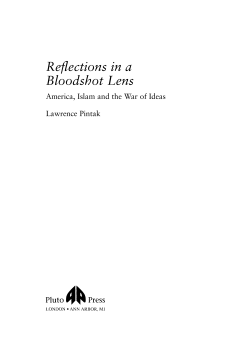
Additional Information
Book Details
Abstract
There exists today a tragic rift between Americans and the world’s Muslims. Yet in the immediate aftermath of 9/11, there was widespread sympathy for the US throughout the Muslim world.
This book explores what happened. It examines the disconnect that leads Americans and Muslims to view the same words and images in fundamentally different ways. Partly a result of a centuries-old 'us' against 'them' dichotomy, the problem is exacerbated by an increasingly polarised media and by leaders on both sides who either don't understand or don't care what impact their words and policies have in the world at large.
Reflections in a Bloodshot Lens argues that the Arab media revolution and the rise of 'patriot-journalists' in the US marginalised voices of moderation, distorting perceptions on both sides of the divide with potentially disastrous results.
'A compelling and long-needed work'
Charles A. Krohn, Former Deputy Chief of Public Affairs, U.S. Army
'An acute, informed and timely insight into colliding worlds of perception which dominate the global agenda'
Jim Muir, Middle East correspondent for the BBC and others
'Pintak combines the keen eye of an experienced journalist with [a] sharp intellect. [He] is not afraid to demolish entrenched mythologies'
Hisham Melhem, Washington correspondent, an-Nahar newspaper (Lebanon) and host, Al-Arabiya TV's Across the Ocean
'This fine book should stimulate some much-needed thinking about the dangers the US public and policy makers face because of their simplistic world view'
Philip Seib, Lucius W. Nieman Professor of Journalism, Marquette University; author of Beyond the Front Lines: How the News Media Cover a World Shaped by War.
